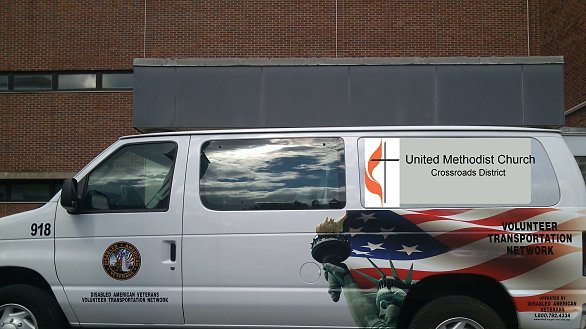By Scott Stumpf
It was the spring of 1987, and budget cuts came down hard on American Veterans. Congress eliminated all funding for the Veteran’s Beneficiary Program. No longer would the federal government reimburse veterans for the costs of transportation to Veteran’s Affairs (VA) medical facilities.
With so many disabled veterans living on small fixed incomes, travel costs were forced to give way to shelter and food. Health needed to be sacrificed for everyday necessities.
These were and are our nation’s heroes. They traveled the globe to protect our freedoms. Suddenly, they were hard pressed to travel the distance from their homes to appointments at VA medical centers and clinics. Those who gave so much for our country were suddenly abandoned, unable to get the medical treatment they justly deserved.
The Disabled American Veterans (DAV) could not ignore this injustice. They began organizing volunteer drivers and privately funded vehicles to transport veterans in communities across the United States. Today, this transportation network carries more than half a million veterans to and from their appointments at VA medical facilities at no cost. Throughout the country, DAV hospital service coordinators organize transportation programs at more than 180 VA medical facilities.
At home
In Central New York, 300 volunteers based out of the Syracuse VA Medical Center and its community-based outpatient clinics operate a fleet of 34 vehicles that support the transportation needs of veterans within 13,451 square miles.
This is the largest VA region of New York, and without the transportation provided by our network, veterans of modest means or those who cannot drive themselves, might forego appointments for life-sustaining or critical care to which they are entitled. A free, friendly lift to a VA-approved medical engagement can make all the difference for a veteran living in one of the 14 counties we serve.
Reach out
Our fleet is aging. This situation jeopardizes the sustainability of our program. However, with the financial support of the community at large, we can make sure that no individual who served this country is denied proper medical care just because the veteran cannot reach a VA facility. This financial support would ensure that veterans would not have to sacrifice food and lodging – or neglect their health issues – because they cannot afford transportation.
Community partnership
In the fall of 2012, my wife and I were volunteering at the Syracuse VA Medical Center, and also helped at a DAV facility. I noted the aging vans that were transporting veterans to the hospitals and clinics.
I suggested to Steve Ranous, president of the Crossroads District UM Men, that it would be a great ministry if we could purchase a seven-passenger Ford Flex for the VA.
Steve presented the idea to the Rev. Darryl Barrow, superintendent of the Crossroads District. He suggested we ask all the churches within the district to participate.
It was then I realized, “We can do this.”
When you help veterans, you welcome them back into the community. You give back to those who gave their all for us.
Donations from UM Men and churches were matched by DAV National, and in July, 2015, the new van was delivered.
This single donation will result in transporting thousands of veterans to and from medical appointments in relative safety.
This truly is charity that begins at home and keeps on giving and a great way to do something for the men, women, and families that have protected us over the years.
Scott Stumpf is a member of Fayetteville UMC and a leader of the effort to purchase the $14,500 van.


